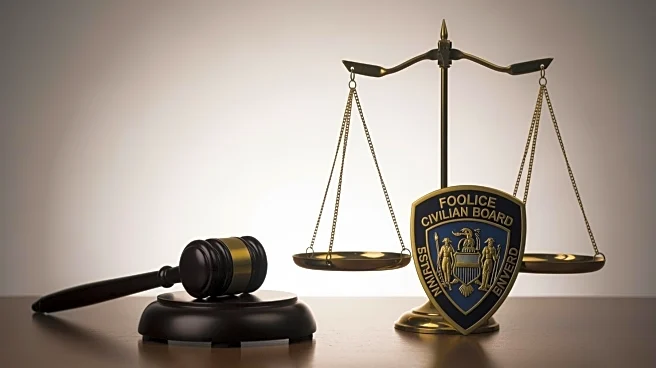What's Happening?
Zohran Mamdani has proposed a significant change in the disciplinary process for New York Police Department (NYPD) officers. His plan suggests transferring the final authority on police officer discipline
from the NYPD commissioner to the Civilian Complaint Review Board (CCRB). Currently, the CCRB can recommend sanctions for substantiated complaints, but the police commissioner retains the power to make the final decision, often deviating from the CCRB's recommendations. Mamdani's proposal aims to give the CCRB, which is perceived by many officers as hostile, the ultimate say in disciplinary matters. Critics argue that this shift could undermine the chain of command within the NYPD and affect the department's ability to maintain public safety effectively.
Why It's Important?
The proposal has raised concerns about its potential impact on public safety and police morale. Critics, including former NYPD commissioner William J. Bratton, argue that the CCRB lacks the law enforcement experience necessary to make informed disciplinary decisions. They fear that the change could disincentivize proactive policing and lead to increased crime rates. The NYPD commissioner is seen as better positioned to balance political pressures and make unpopular but necessary decisions to maintain order. If implemented, Mamdani's plan could make the role of police commissioner less attractive to qualified candidates, potentially affecting the department's leadership and effectiveness.
What's Next?
If Mamdani's proposal gains traction, it could lead to significant changes in how the NYPD operates and is governed. The proposal may face opposition from police unions, city officials, and public safety advocates concerned about its implications. The debate over the proposal could influence upcoming mayoral races and public policy discussions in New York City. Stakeholders will likely engage in discussions and negotiations to address concerns and explore alternative solutions to improve police accountability while ensuring public safety.
Beyond the Headlines
The proposal highlights broader issues of police accountability and civilian oversight in law enforcement. It raises questions about the balance between effective policing and community trust, as well as the role of civilian boards in shaping police practices. The debate may prompt discussions on the ethical and legal dimensions of police governance and the long-term impact on community-police relations.










